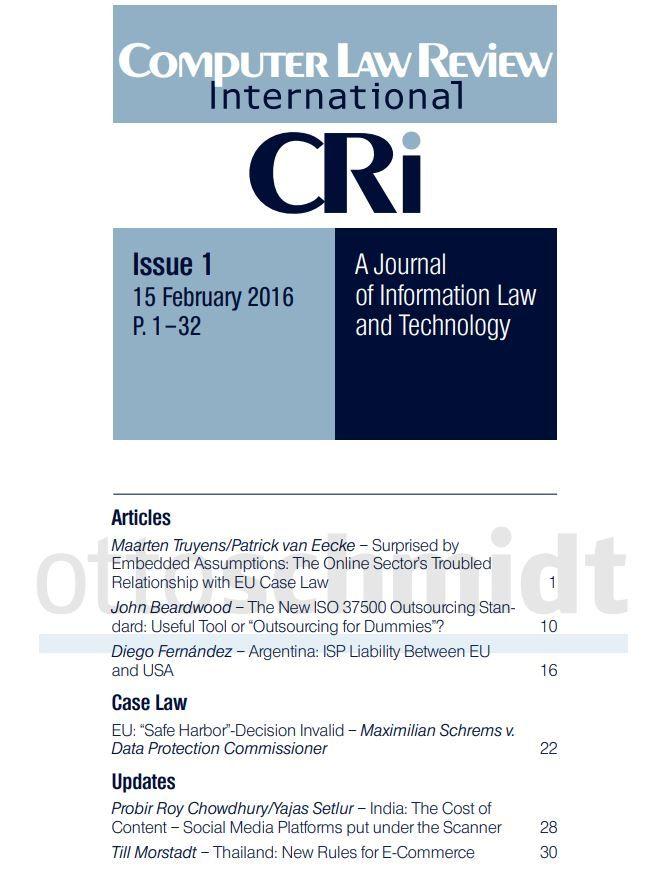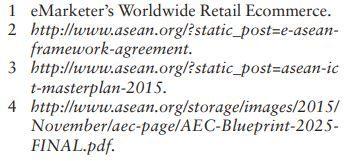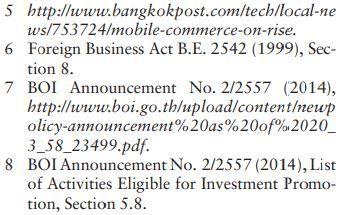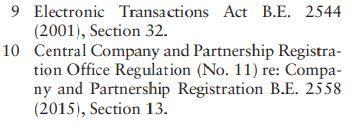
Thailand: New Rules for E-Commerce E-Commerce in Thailand and Southeast Asia is still in its infancy. However, the untapped potential is huge. In 2013, only 28 % of Southeast Asia’s inhabitants used the internet and only 16 % could be classified as digital buyers.1 1 eMarketer’s Worldwide Retail Ecommerce. Japan,
at the same time, had 94 % internet users and 74 % digital buyers, whereas of Thailand’s 65 million inhabitants, only 19 million (29 %) used the internet and only 14 million (22 %) were digital buyers. In Europe, between 5 to 8 % of total retail sales were related to e-commerce. In Southeast Asia, it was less
than 1 %.
However, Southeast Asia is determined to improve e-commerce and already took necessary steps:
In 1999, the ASEAN countries adopted the “e-ASEAN Initiative”. This initiative was aimed at improving the ICT (“Information and Communication Technology”) throughout ASEAN. One key provision was to establish and strengthen e-commerce. A framework agreement has been concluded in 2012.2
In 2011, the “ICT ASEAN Masterplan” was introduced to facilitate the further digital integration of ASEAN and to boost ecommerce (see 4.a) below).3
3 https://www.asean.org/?static_post=asean-ic
t-masterplan-2015.
In November 2015, the new “Blueprint 2025” for the ASEAN Economic Community (“AEC”) was introduced4 4 https://www.asean.org/storage/images/2015/
November/aec-page/AEC-Blueprint-2025-FINAL.pdf., proposing to strengthen e-commerce throughout ASEAN by improving consumer protection
and supporting small and medium enterprises to distribute their products by electronic means (see 4.b) below).
Nevertheless, challenges remain. Aside from structural challenges, practical challenges hinder e-commerce from flourishing, such as the big gap regarding digital infrastructure between rural and metropolitan areas.
The following article shall give a brief overview of the legal framework for e-commerce businesses in Thailand (1.) and shall describe the most recent legal developments (2.). The article shall further outline the differences to related EU legislation (3.) and give an outlook on the future of e-commerce in Thailand (4.).
1. Market and Legal Framework
Thailand’s network capacities are comparably well developed, at least in metropolitan areas. The Thai government keeps expanding the infrastructure, especially for mobile devices. In December 2015, two “4G-licences” were auctioned for a price of approximately THB 75 billion (roughly 1.875 billion!). Analysts put this price at four times the actual market value of the licenses, indicating the importance of mobile internet in Thailand: “M-Commerce” is considered a very strong future market in Thailand.5
The most common forms of e-commerce in Thailand are online shops and Electronic Marketplaces (“EMP”). Big players are “www.lazada.co.th”and “www.weloveshopping.com”. ”Social Commerce”, i.e. commerce taking place over social media, is also gaining momentum.
a) Foreign Investment Law
The Thai foreign investment law is rather restrictive and requires majority foreign-owned companies to obtain a Foreign Business License
(“FBL”) for most activities.6 Instead of the lengthy application process to obtain an FBL, investors can apply for investment promotion through the Thailand Board of Investment (“BOI”). Apart from the possibility to hold 100 % of the company’s shares, BOI-promoted companies benefit from various tax and nontax incentives.7
Regarding e-commerce, only the operation of Electronic Marketplaces is eligible for BOI promotion.8 The operation of online shops for trading products is not eligible for BOI promotion and is generally also not eligible for an FBL. The only way to operate an online shop is to increase the capital to THB 100 million (approx. 2.5 million) which makes the company eligible for an exemption under the Foreign Business Act. Companies with a paid-up capital of
at least THB 100 million are allowed to conduct retail or wholesale business in Thailand without requiring any further licence. Most larger European e-commerce players such as Lazada and Zalora make use of this exemption.
Special rights are granted to U.S. American investors under the ThaiUS Treaty of Amity. The treaty gives majority U.S.-owned companies a
fast track access to an FBL in nearly all areas including trading. However, to benefit from the treaty, ultimate beneficial U.S.-American ownership of the Thai company has to e proven to the authorities.
b) General Requirements
Enterprises offering goods or services on the internet, e.g. via online shops or EMP, have to apply for an e-commerce Certificate to ensure their compliance with quality standards.9 Furthermore, other applicable laws have to be complied with, such as providing a product warranty and complying with advertising guidelines. Details depend on the circumstances of the proposed business.
2. Recent Legal Developments
a) Direct Sales and Direct Marketing Act
Since 1 July 2015, all enterprises conducting direct marketing business in Thailand have to apply for a special Direct Marketing License,
based on the Direct Sales and Direct Marketing Act B.E. 2545 (2002).
This requirement is intended to contribute to a higher degree of consumer protection, as consumers in online trade are not able to inspect the goods regarding their conformity with the advertised product before purchasing. Direct Marketing Licenses are usually issued within 60 days after the submission of complete application documents with the Office of the Consumer Protection Board.
Direct marketing without a proper license is subject to imprisonment of up to 1 year and/or fines of up to THB 100,000 (approx. 2,500), as well as a fine of THB 10,000 for every day of continued direct marketing without a license.
b) Draft Legislation
Currently, Thailand is reviewing several proposals for new or revised legislation.11
The details are still under discussion.
aa) Draft Electronic Transactions Act
The Electronic Transactions Act shall improve and secure electronic transactions. It foresees the establishment of the “Office of the National Electronic Transaction Development”.
bb) Draft Cyber Security Protection Act
The draft provides new regulations regarding cyber-security and their enforcement through the new “National Cyber Security Protection
Committee”.
cc) Draft Data Privacy Act
The draft regulates the collection, utilization or disclosure of data which enables to identify individuals. It gives enforceable rights to data owners. It foresees the establishment of the “Data Privacy Protection Committee” to oversee and enforce the act.
The recent developments emphasize Thailand’s commitment to improving relevant legislature. Especially the improvements regarding cybersecurity and data protection are necessary to facilitate the acceptance of e-commerce in Thailand and to bring it up to international standards.
4. Thai/ASEAN vs. EU Legislation
Legislation similar to Directive 2000/31/EC does not exist in Thailand and, therefore, compared to the EU, consumer protection in ecommerce is rather limited. However, ASEAN tries to improve and harmonise the respective domestic legislations.
a) The ICT ASEAN Masterplan 2015
The Masterplan 2015 aims to deliver the following four key outcomes:
Establishing ICT as an engine of growth for ASEAN countries;
Promoting the recognition for ASEAN as a global ICT hub;
Enhancing the quality of life for peoples of ASEAN; and Contributing towards ASEAN integration.
The full implementation of the plan is still outstanding.13 However, the draft recognizes ICT as a major source of development, empowerment, and innovation. It sees the need to harmonise regulatory practices and ICT standards and it also urges the member states to provide incentives and promotions.
b) The AEC Blueprint 2025
The AEC Blueprint 2025 sets the goal of developing a comprehensive ASEAN agreement on e-commerce, addressing the following issues:
Harmonising consumer rights and protection laws;
Harmonising the legal framework for online dispute resolution, taking into account international standards;
Developing interoperable, mutually recognized, secure, reliable and user-friendly e-identification and authorisation schemes;
Developing a coherent and comprehensive framework for personal data protection.
c) Conclusion
Neither the “Masterplan 2015” nor the “Blueprint 2025” is comparable to the Directive 2001/31/EC. It remains within the responsibility of
each member state to introduce domestic legislation facilitating e-commerce.
For example, foreign (i.e. non-Thai) companies providing e-commerce services to Thai customers are not covered by Thai legislation as long as they are not conducting their business from within Thailand. Due to a lack of ASEAN-wide legislation, local companies might consider law-shopping, i.e. looking for the jurisdiction with the least strict laws on e-commerce to provide their services ASEAN-wide. To avoid a raceto-the-bottom regarding consumer
protection, market-wide laws comparable to the EU would be desirable.14
5. Outlook
To tap the full potential of e-commerce not only in the Thai market but on an ASEAN-wide scale, an increase of regional integration will be required. In particular, an ASEANwide legislation regarding the following key aspects is desirable:
Harmonized laws on consumer protection, comparable to the EU’s Unfair Commercial Practices Directive15
ASEAN-wide dispute resolution body;
Setting up a regional task force against cyber crime, comparable to the EU’s Cybercrime Centre16
Furthermore, to extend the internet broadband internet coverage, stateaided funding could foster private sector broadband deployment projects for remote areas where reliable internet coverage is currently not sufficiently available. Till Morstadt, Bangkok. Further information about the author on p. 32
______________________________________________________________







